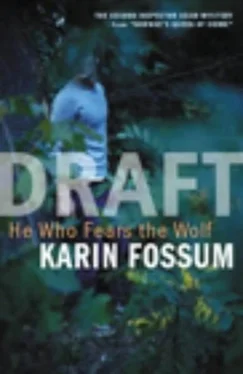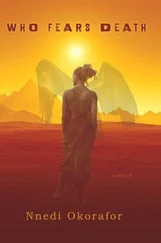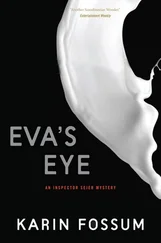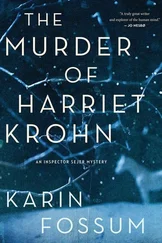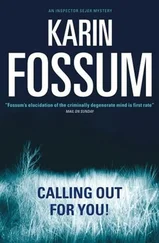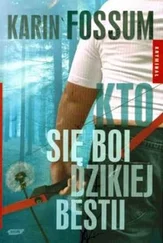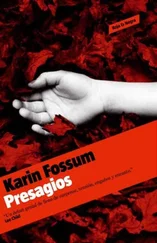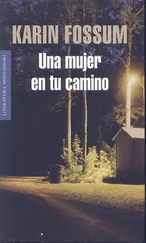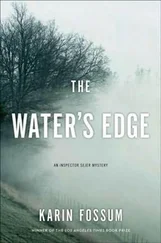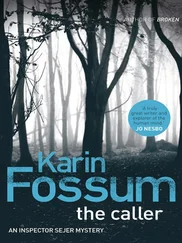"Root, stem and leaf," he muttered.
Kannick realised that they were both mad. Maybe they'd escaped from the asylum together. Two ticking time bombs. It was best to stay calm. He breathed as lightly as he could.
Errki had moved away. He was sitting on the floor, leaning against the old, broken wardrobe. It was peaceful now. The drums and the bagpipe had stopped. He was resting, with his hand on the pistol.
A forest worker turned his red Massey Ferguson tractor on to the plateau, heading for the short stretch of forest road where he intended to park. Surprised, he stared at the green tarpaulin, then switched off the engine and got down.
He shoved the smooth green fabric off the roof of the car and peered inside. Empty. Except for a little pill bottle with a screw-on lid lying on the floor in the front. He opened the door, picked it up, and read the label. Trilafon, 25 milligrams, three times a day. For someone named Errki Johrma, prescribed by Dr S. Struel. A small, white, abandoned car. Unlocked. He remembered something about a bank robbery that morning; it had been on the news. The car was a Renault Mégane. He went back to his tractor, swung it around again, and set course for home.
Less than an hour later two cars drove up to the plateau. Five men and three dogs spilled out. The three excited Alsatians were immediately growling and whining. A five-year-old male named Sharif was first, followed by Nero, who was a little smaller and a lighter colour. He was just as agitated as Sharif, tugging on his lead. The third dog had a shaggier coat and moved more steadily than the others. His name was Zeb, and his handler was Ellmann. Every time they went out on patrol together, he wondered if it might be the last time. He looked down at the dog's dark head. It was almost time to retire him, and he didn't know if he had the energy to train a new dog. It seemed to him that after Zeb, any other animal would be a disappointment.
The starting point was not ideal. The dry, crackling forest from which all moisture had evaporated would not hold on to scents for long.
Sharif leaped inside the car. He sniffed at the driver's seat and the floor, at the carpet beside the rubber mats, then at the passenger's seat, his tail wagging. He came back out and began sniffing at the dry ground, continuing to wag his tail vigorously, then started down the path. The other dogs did the same, repeating the procedure. The men stared at the dense woods and locked their cars. The dogs stared at their masters, waiting for the magic words that would release them.
All five men had guns. The hard weight at their belts was both comforting and frightening. The assignment was an exhilarating one for the dog handlers. This was what they had pictured when they joined the police force as young recruits, before applying for the dog patrol. All three were mature men. If being between 30 and 40 could be considered mature, as Sejer had said wryly. They had hunted for many different things during their years of service, and been successful many times. They loved the peace of the woods, the not knowing, the work with the dogs. The sound of panting dogs, of twigs breaking, of rustling leaves, the buzzing of thousands of insects. All of their senses were on high alert, their eyes fixed on the ground, taking in the smallest detail: a cigarette end, a snapped twig, or the remains of a fire. Studying the dogs, the way their tails moved, whether they were wagging briskly or were suddenly lowered, stopping altogether. At the same time they were waiting to hear something from Headquarters: word that the two had been found elsewhere, perhaps. Or that the bank robber had struck again, that the hostage had been found in good condition or lying in a ditch with his skull split open. Anything was possible. It was the not knowing that excited them; no two days were alike. They might find someone hanging from a tree. Or sitting under a tree trunk, exhausted but happy to be discovered. Or dead from an overdose. And afterwards, the release. The eased tension. But this time it was something different. Two individuals in flight, and most likely desperate.
Track!
The magic word! The dogs were instantly attentive. For a few seconds they meandered around at the start of the path. But very rapidly they set off, focused on one thing only: following the scent they had picked up in the car. Ellmann whispered: "No doubt about it, they have picked up the trail."
The others nodded. The dogs pulled them up the slope, their muscles straining. All three animals were on it, with Sharif in the lead. The men panted after them, hot in their overalls. The three dogs stayed together. They had been given plenty of water before they set off, and they had an endurance that the men could only envy. The men were in good condition; working with the dogs had seen to that – years of strenuous training. But the cursed heat was sapping their energy. How far could the two fugitives have gone?
The woods looked dead, as if crying out for water. The men had maps and knew where the paths led and the location of the old homesteads. One of the men stuck his hand in his pocket, looking for chewing gum. He kept his eyes on Nero. The dog swung his nose from side to side, every so often taking a detour, making a little circle, as if he wanted to turn around. But then he kept on going. Sharif was still in the lead. The fur on his head and back was black, his coat looked thick and shiny in the fading sunlight. His tail was like a big golden banner, and his paws were broad and powerful. None of the men could imagine anything more beautiful than a well-groomed Alsatian. An Alsatian was the perfect dog, the way a dog ought to look.
After 15 minutes they changed places and let Zeb go first. The competitive instinct was immediately aroused, and the dogs intensified their efforts. Even so, they began to waver, their tails started to sink, they no longer sniffed so eagerly. At first Nero and Sharif pressed on, but then wanted to turn back. The men took their time, seizing the opportunity to rest a little after the difficult climb. They were up on a ridge. From here they could look down at the main road and the barrier beside the toll booth.
"Bet they stopped here to rest," Sejer said in a low voice.
The others nodded. They had stood here and looked down at the barrier and the squad car. And then they had gone on. But in which direction?
"Here's a cigarette end."
Skarre picked it up. "Roll-your-own. Big Ben paper."
He slipped it inside a plastic bag and put it in his pocket, then kept on searching, but found nothing more.
"Let's keep Zeb in the lead, and let the others reconnoitre," Ellmann suggested.
Nero and Sharif began sweeping the area from side to side, covering a range of about 50 metres. Zeb trotted on, sticking to the path. The scent was unclear. The dogs no longer seemed so keen, pausing now and then, acting distracted. The men looked back. Not down to the farm where the murdered woman lived. Maybe up to the old homestead sites? In this heat it seemed most likely that the fugitives had stopped to rest in one of the old mountain huts. If so, the dogs would find their trail up there, stronger than in this dry terrain.
It was abnormally quiet in the woods. In the autumn there was much more activity, with hunters and berry pickers. But right now it was too hot for anyone to be taking a walk in the woods unless they had to. Or were being paid to, and were plagued by an incurable lust for adventure that coursed through their veins like tiny little ants and gave them no peace.
Sejer ran his hand over his forehead and then checked his gun. At the shooting range he was a good shot, but he realised that would not mean very much if it came to a live exchange of fire. And that made him uneasy. A single error in judgement could have disastrous consequences. Suspension. Disability. Death. Anything could happen. For some reason he was feeling vulnerable, as if life had taken on more meaning. He forced the thoughts out of his mind and strode briskly on, casting a glance at Skarre, who had pulled down the peak of his cap to keep out the sun.
Читать дальше
